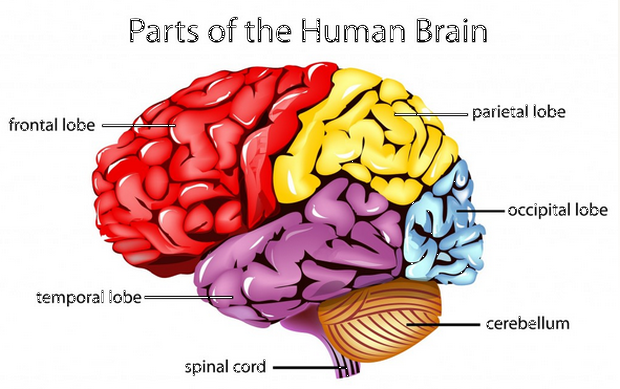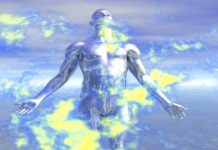What separates humans from other animals? One of the significant differences which makes us special is our brain. Many different parts of the human brain perform different functions. For example, sensorimotor coordination is one major cerebellum function. Motor control in terms of humans is the use of movement related functions and cognitive controlling language and attention functions. Thus clearly, cerebellum rightfully earns itself the name little brain.
When we search for the seat of humanity, we might be looking at the wrong part of the brain. Most neuroscientists assume that the neocortex, the brain’s distinctive folded outer layer, is what makes us uniquely human. But a new study suggests it was the cerebellum that grew much faster in our ape ancestors.
The cerebellum is a part of the hind brain, located at the base of the skull (purple side lobes in the picture). It is involved in functions including muscle coordination, fine movement and balance. Rob Barton of Durham University and Chris Venditti of the University of Reading, both in the UK, examined how the relative sizes of different parts of the brain changed as primates evolved.

During the evolution of monkeys, the researchers found the neocortex and cerebellum grew in tandem – a change in one was swiftly followed by a change in the other. Then, from the first apes around 25 million years ago through to chimpanzees and humans, the cerebellum grew much faster than the neocortex. As a result, the cerebellum in apes and humans contains far more neurons than that of a monkey, even when the brain is scaled up to the size it would be in an ape.
the cerebellum in apes and humans contains far more neurons than that of a monkey
“The difference in ape cerebellar volume, relative to a scaled monkey brain, is equal to 16 billion extra neurons,” says Barton. “That’s the number of neurons in the entire human neocortex.” Such rapid and extensive growth must have happened for a reason. Given the cerebellum’s functions, Barton suggests it may have started with the first apes learning to swing from branch to branch, as modern gibbons do.
The extra coordination skills could then have unleashed other “technical” skills like making tools and fine finger movements. Some researchers, like Richard Byrne of the University of St Andrews in the UK, think that such technical intelligence is a defining feature of apes. Barton’s data is solid, but he overstates the importance of the cerebellum, says Susanne Shultz of the University of Manchester, UK. “The cerebellum is important in coordination and synthesis,” she says. “But I don’t think it takes away from the fundamental importance of the neocortex.”
neocortex is linked to the distinctive human traits like social skills and the ability to plan many years ahead.
Shultz points out that more than a century of neuroscience has demonstrated the importance of the neocortex for distinctively human traits like social skills and the ability to plan many years ahead. “All you have to do is knock out the prefrontal area and you start to see all these problems in ‘human’ areas,” says Shultz.
Since the cerebellum pulls together disparate sources of information from all over the brain and uses it to control motor functions such as hand gestures and walking, it may simply have had to grow once the rest of the ape brain ballooned. “As your brain gets increasingly large, it becomes increasingly important to synthesise and coordinate all the information you’re holding,” says Shultz.
Where Shultz and Barton agree is that the neocortex and cerebellum are densely interlinked, so we might mislead ourselves by focusing on one to the exclusion of the other.
“We should think about integration in the brain as a whole,” says Shultz.
-end-




































